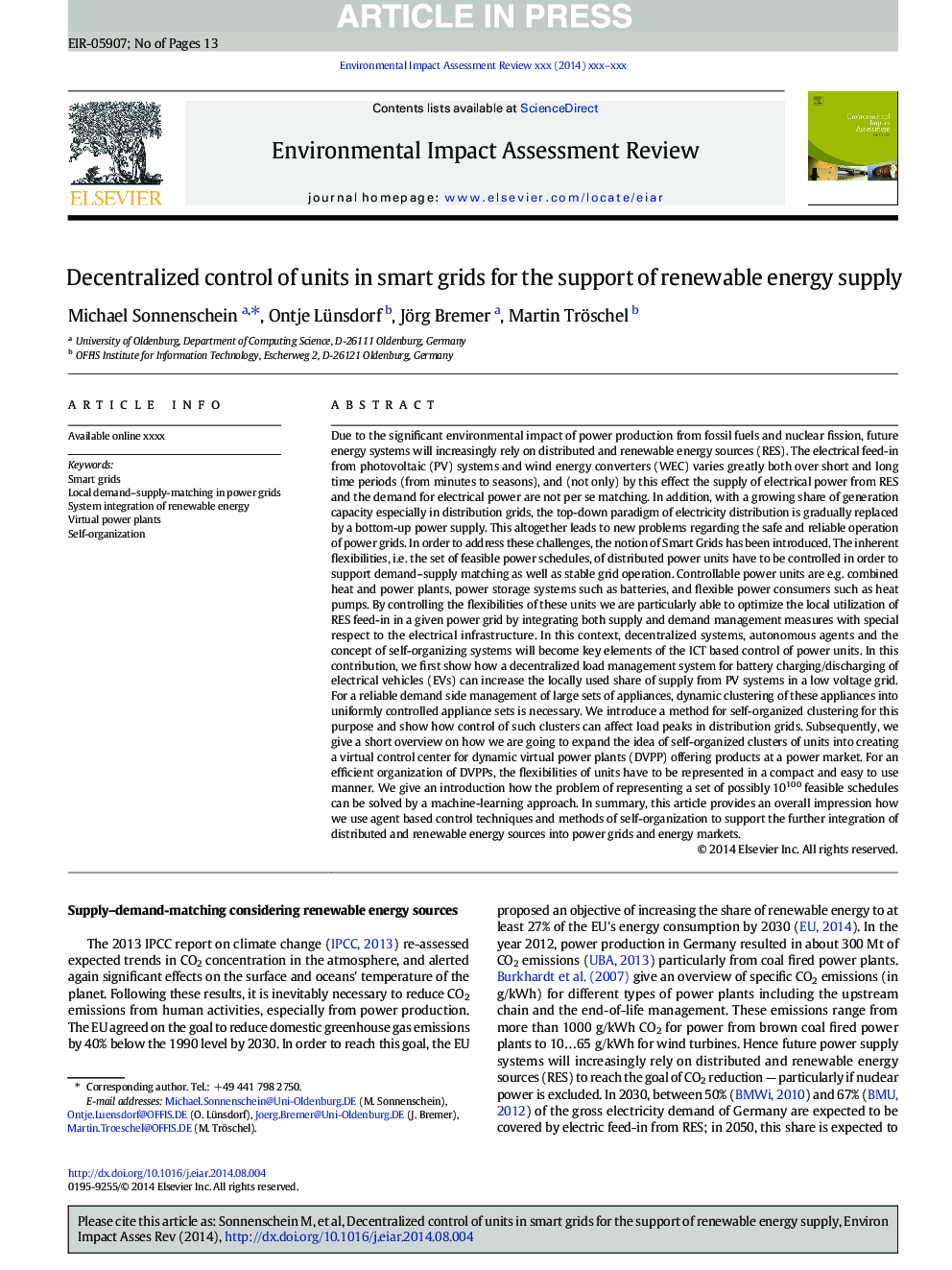| کد مقاله | کد نشریه | سال انتشار | مقاله انگلیسی | نسخه تمام متن |
|---|---|---|---|---|
| 7465334 | 1484993 | 2015 | 13 صفحه PDF | دانلود رایگان |
عنوان انگلیسی مقاله ISI
Decentralized control of units in smart grids for the support of renewable energy supply
ترجمه فارسی عنوان
کنترل انحصاری واحدهای شبکه های هوشمند برای حمایت از تامین انرژی تجدید پذیر
دانلود مقاله + سفارش ترجمه
دانلود مقاله ISI انگلیسی
رایگان برای ایرانیان
کلمات کلیدی
شبکه های هوشمند تقاضای محلی در تطبیق عرضه در شبکه های برق، ادغام سیستم های انرژی تجدید پذیر، نیروگاههای مجازی، خود سازمان،
موضوعات مرتبط
مهندسی و علوم پایه
مهندسی انرژی
انرژی های تجدید پذیر، توسعه پایدار و محیط زیست
چکیده انگلیسی
Due to the significant environmental impact of power production from fossil fuels and nuclear fission, future energy systems will increasingly rely on distributed and renewable energy sources (RES). The electrical feed-in from photovoltaic (PV) systems and wind energy converters (WEC) varies greatly both over short and long time periods (from minutes to seasons), and (not only) by this effect the supply of electrical power from RES and the demand for electrical power are not per se matching. In addition, with a growing share of generation capacity especially in distribution grids, the top-down paradigm of electricity distribution is gradually replaced by a bottom-up power supply. This altogether leads to new problems regarding the safe and reliable operation of power grids. In order to address these challenges, the notion of Smart Grids has been introduced. The inherent flexibilities, i.e. the set of feasible power schedules, of distributed power units have to be controlled in order to support demand-supply matching as well as stable grid operation. Controllable power units are e.g. combined heat and power plants, power storage systems such as batteries, and flexible power consumers such as heat pumps. By controlling the flexibilities of these units we are particularly able to optimize the local utilization of RES feed-in in a given power grid by integrating both supply and demand management measures with special respect to the electrical infrastructure. In this context, decentralized systems, autonomous agents and the concept of self-organizing systems will become key elements of the ICT based control of power units. In this contribution, we first show how a decentralized load management system for battery charging/discharging of electrical vehicles (EVs) can increase the locally used share of supply from PV systems in a low voltage grid. For a reliable demand side management of large sets of appliances, dynamic clustering of these appliances into uniformly controlled appliance sets is necessary. We introduce a method for self-organized clustering for this purpose and show how control of such clusters can affect load peaks in distribution grids. Subsequently, we give a short overview on how we are going to expand the idea of self-organized clusters of units into creating a virtual control center for dynamic virtual power plants (DVPP) offering products at a power market. For an efficient organization of DVPPs, the flexibilities of units have to be represented in a compact and easy to use manner. We give an introduction how the problem of representing a set of possibly 10100 feasible schedules can be solved by a machine-learning approach. In summary, this article provides an overall impression how we use agent based control techniques and methods of self-organization to support the further integration of distributed and renewable energy sources into power grids and energy markets.
ناشر
Database: Elsevier - ScienceDirect (ساینس دایرکت)
Journal: Environmental Impact Assessment Review - Volume 52, April 2015, Pages 40-52
Journal: Environmental Impact Assessment Review - Volume 52, April 2015, Pages 40-52
نویسندگان
Michael Sonnenschein, Ontje Lünsdorf, Jörg Bremer, Martin Tröschel,
